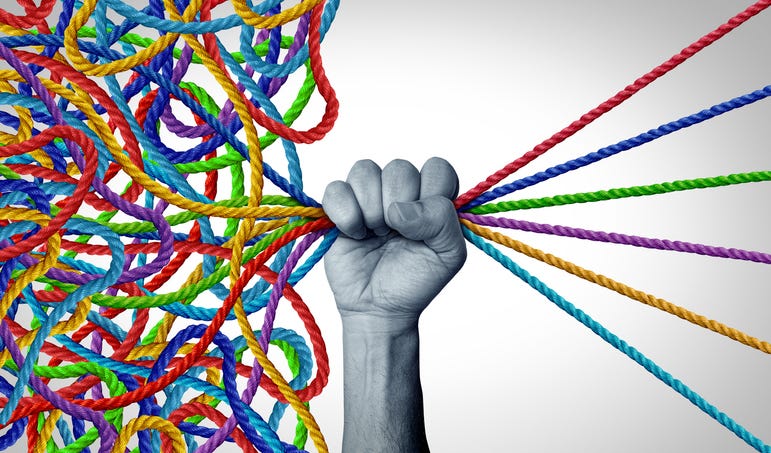Breaking: As last night’s strikes on Iran unfold, “chaos” acquires a grim immediacy. I wrote this before the news. It now feels almost indecent to speak of chaos, as if it weren’t already scripting itself. But, as political thinker Hannah Arendt insists in “Thinking and Moral Considerations” (1971), the true indecency lies in being overwhelmed by chaos, ceasing to think—forsaking reflection, thereby aiding what we condemn.
Not long ago, a butterfly over Tokyo could lead to a tornado in West Virginia. Chaos theory explained the weather—and, by extension, everything else. James Gleick’s Chaos: Making a New Science was a bestseller. The epilogue to another, Does God Play Dice?, ends: “If God played dice, He’d win.”
Religion offered its own response. Your life may be more chaotic than you expected. But the God of the Bible is neither overwhelmed nor perplexed by it. He [sic] knows how to master it and make meaning. In Genesis, his response to chaos wasn’t peace—it was order: first day and night; then sun, moon, and stars; and finally, in what could only be called a daring act of trust, man and woman.
But beneath the wit, something unsettling stirs. If we live in a post-truth era, the crisis runs deeper. When identity becomes fluid, truth provisional, meaning negotiable, and what once was sex becomes gender, even language starts to slide. Deepfakes and AI-generated content add new layers of uncertainty. Words lose their weight. What we say no longer reflects what we mean.
On the other hand, maybe the answer to Chaos 2.0 isn’t progress but memory. A world where truth rested on trust, authority, and personal integrity wasn’t primitive; it was ordered. Words carried weight. The self wasn’t an endless project—something to be managed, optimized, or explained—but a given, shaped by story, place, and limit. Not a personal brand updated daily, but a neighbor, a sibling, a citizen, a friend. Not fungible or exchangeable for a job, a vote, or another affair.
We speak of freedom as if it were clarity. But maybe clarity comes first—truth that requires no branding, no spin. Freedom without clarity is just noise in disguise.
In To the Lighthouse, Virginia Woolf gives us a dinner scene where scattered emotions, unspoken tensions, and fleeting thoughts somehow hold together—not through explanation, but presence. Mrs Ramsay says almost nothing, yet her stillness draws everyone into coherence. It isn’t clarity she offers, but something deeper: a moment of meaning before the world resumes its drift.
Today, in the noise of Chaos 2.0, we mistake constant expression for connection and endless updates for understanding. But Woolf reminds us: coherence doesn’t always come from speaking more—it comes from holding still long enough for others to exist in the same sentence. That’s not nostalgia. It’s what truth once felt like.
A butterfly over Tokyo, a twitch on Wall Street—or the latest poll on the President—may start a storm. Truth already rumbles.
Notes and Reading
Chaos: The Making of a New Science – James Gleick (rev. 2011). A landmark account of chaos theory’s impact across fields—from weather to economics—popularizing the science of complexity.
Does God Play Dice? – Ian Stewart (1989). On the shift from Newtonian predictability to quantum uncertainty: the universe as lottery, not clockwork.
The Spell of the Sensuous – David Abram (1996). A world that makes sense. With digital media and AI eroding shared meaning, Abram’s critique feels newly urgent.
Gleick is a historian of science whose work has chronicled the cultural impact of modern technology. Stewart is an Emeritus Professor of Mathematics at the University of Warwick. Abram, a geophilosopher and cultural ecologist, is a Visiting Scholar in Ecology and Natural Philosophy at Harvard Divinity School.
Tip-Off #212 - Fear and Hospitality
Tip-Off #211 - Sore Truth




